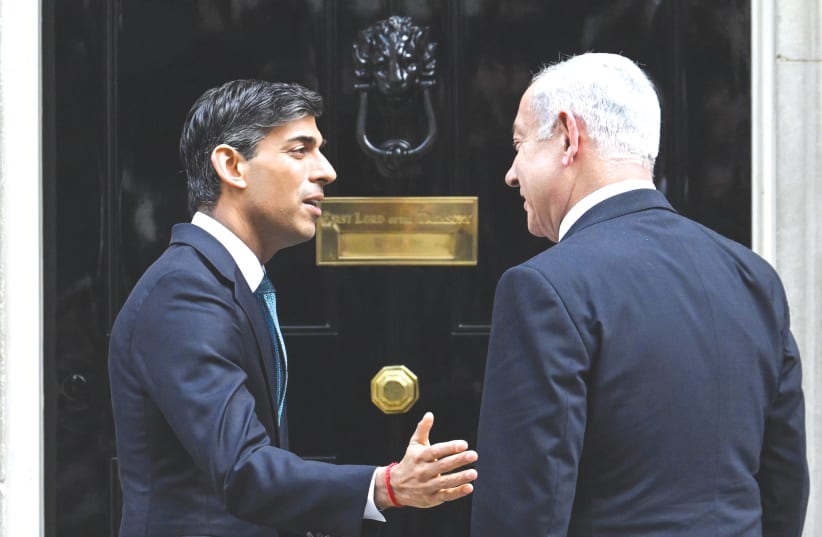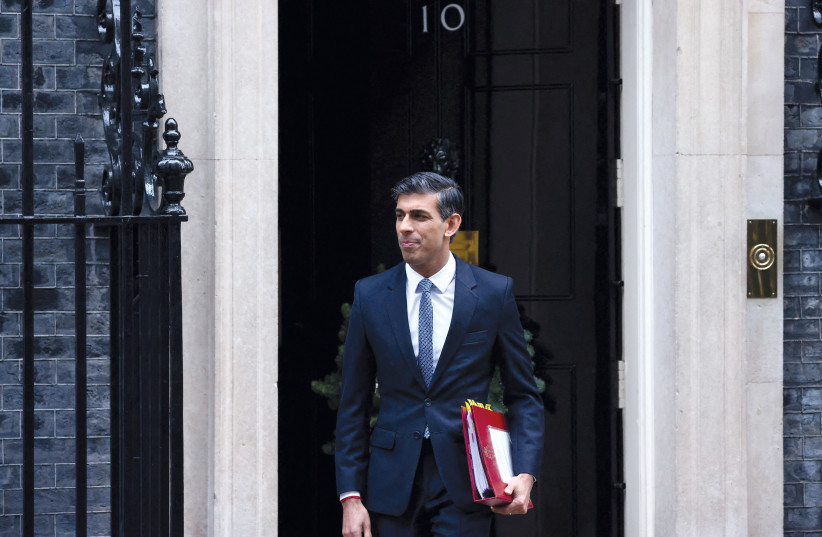British Prime Minister Rishi Sunak told Israel’s Prime Minister Benjamin Netanyahu this past week that he is concerned about “growing tensions in the West Bank” and wants Israel to undertake “efforts to de-escalate, particularly ahead of the upcoming religious holidays.”
There should have been a translator in the room. Because even though both men were speaking English, the actual translation of what Sunak said was: “Do as I say, not as I do.”
“Do as I say, not as I do.”
What Rishi Sunak actually meant
For even as Britain’s prime minister was giving Israel unsolicited advice about “de-escalating” its self-defense efforts, British troops are engaged in their own battles around the world, none of which show any signs of de-escalating.
Britain's own conflicts around the world
There are British troops fighting ISIS in Iraq, and the Royal Air Force periodically carries out air strikes on ISIS sites there and in neighboring Syria. Last December 20, for example, a British Reaper drone aircraft fired Hellfire missiles at a building near Al Bab, in northern Syria, because “at least one active Daesh [ISIS] terrorist was known to be present,” according to a government announcement. Imagine that: just one terrorist was there, and that was sufficient for the Brits to unleash hellfire. Literally.
I wonder how Sunak would feel if Israel called on him to “de-escalate the growing tensions in the al-Bab region” in advance of Ramadan.
There are British troops in Nigeria, helping to fight Boko Haram terrorists. There are also British military personnel in Somalia, training the Somalian army in anti-terrorism tactics. And until very recently, there were hundreds of British soldiers in Mali, fighting jihadist rebels.
I doubt Sunak would appreciate it if Israel referred to Britain’s conflicts with terrorists in Africa and the Middle East as merely “growing tensions” in the region, as if both sides are guilty and there is no clear aggressor.
In Iraq, Nigeria, Somalia and Mali, the terrorists are the aggressors, and the British are fighting in self-defense in battles far from the British Isles.
In Israel, the Palestinian Arab terrorists are the aggressors, and the Israelis are fighting in self-defense.
None of these conflicts should be characterized as “growing tensions.” They are wars. There are good guys and there are bad guys. Britain and Israel are the good guys. The terrorists are the bad guys.
And, by the way, there are British military personnel stationed in Ukraine, too. They are not directly involved in the fighting, but they are certainly stationed in harm’s way. This is more than just sending weapons to Ukraine, as the United States has done.
These British personnel are teaching Ukrainian soldiers how to use anti-tank and anti-air portable missiles. The assistance that these British trainers are providing is being used by Ukrainian forces in their war of self-defense.
What would Sunak think about describing Russia’s invasion of Ukraine as just “growing tensions?” How about if Israel urged the British to “de-escalate” the conflict, particularly in advance of some upcoming Russian holiday?
Naturally the British would deeply resent any suggestion that their close allies, the Ukrainians, are somehow able to control the conflict, when in reality Ukraine is the victim and it is up to the aggressor, Russia, to determine when the war will end.
Which is exactly how Israelis must have felt when they heard the hypocritical statements made by Britain’s prime minister this week.
It’s not always easy for a political leader to maintain a stable moral compass. No doubt Sunak is under pressure from segments of the British news media, and radical members of parliament, to be even more critical of Israel. But no amount of sniping from The Guardian or the Jeremy Corbyn wing of the Labour Party should cause the prime minister to lose sight of the simple truth about the Palestinian Arab war against Israel.
The writer is an attorney and the father of Alisa Flatow, who was murdered in an Iranian-sponsored Palestinian terrorist attack in 1995. He is the author of A Father’s Story: My Fight for Justice against Iranian Terror, and is an oleh hadash.

